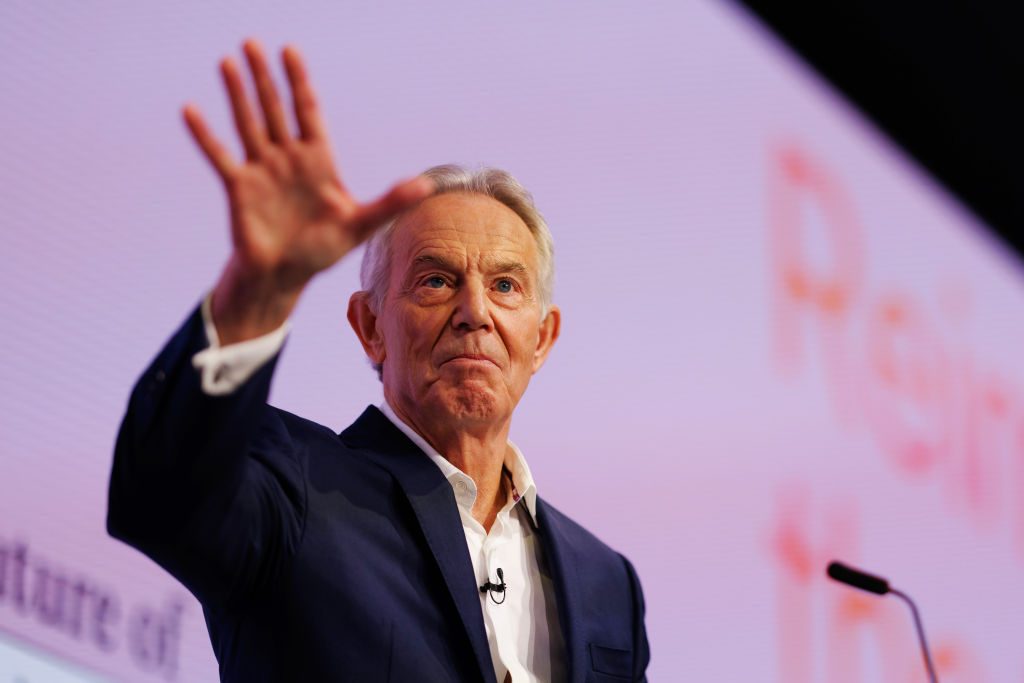Palestinians have a phrase to describe someone who pushes crazy schemes which have no basis in reality: such a person “dreams of watermelon in winter”. Of course, we don’t know exactly what the former British prime minister Tony Blair said about Gaza’s future at his meeting this week with Donald Trump and the President’s son-in-law Jared Kushner. But we can be sure that, not for the first time in this region, Blair’s ideas are pure fiction.
In February, when the US President posted an AI-generated video depicting a future Gazan “Trump riviera” of luxury resorts and skyscrapers, many thought it must be a joke. However, it has since become clear that this was a serious proposal which both Kushner and staff at the Tony Blair Institute (TBI) have had a hand in developing. As the FT reported in July, the TBI has taken part in discussions with Israeli businesspeople about establishing both high-end tourism — to include Dubai-style artificial islands — and an “Elon Musk Smart Manufacturing Zone” when this war finally ends.
As for Kushner, since the end of the first Trump administration he has focused on his investment fund, Affinity Partners, which is backed by rich Saudis and worth $5 billion. As early as February 2024, five months into the war, he was speaking of Gaza’s “valuable waterfront property”. He later supported plans by the George Washington University economist Joseph Pelzman for an “economic solution” to the Gaza conflict along the lines set out by Trump in his video. It is no coincidence that Pelzman suggested this flowed logically from the Abraham Accords between Israel and several Middle Eastern states, which Kushner brokered.
Blair has previously advocated for “economic solutions” to the Israeli-Palestinian conflict. In 2007, after leaving Downing Street, he became the special envoy of the diplomatic Quartet comprising the US, EU, UN and Russia, the body created to help bring about a two-state solution. Yet many Palestinians were sceptical about his appointment, because of his support for the invasion of Iraq and his closeness to Israel. Arabic writers and media outlets were also concerned about his messianic streak, fearing that, like earlier British leaders, he saw himself as some kind of saviour.
His big idea was that “economics goes side by side with politics”. In other words, if he could attract foreign investment to the Palestinian territories and boost growth as a result, and persuade Israel to dismantle the checkpoints and other restrictions which hampered it, this would bring a speedy end to the conflict. Thanks to Blair’s efforts, Israel removed a few of its checkpoints in the West Bank. But when he left his post in 2015, more than 500 remained, while political progress had been negligible.
The only significant difference between the visions of Trump and Blair seems to be that while Trump supports the forced expulsion of Palestinians, Blair has said he will not be party to any scheme that “tries to make Gazans leave Gaza”. Both plans, however, are utterly fantastical.
Let’s start with the fact that the killing and destruction in Israel has continued unabated. My house in al-Bureij in the centre of the Gaza Strip is, somehow, just about still standing; but this week my neighbour’s home, 10 metres away, was hit by an airstrike. The mother of the family, Rima Ghanem, was killed, along with her two-year-old son Mouath. The screams of pain and grief I heard from next door will continue to haunt me.
As for reconstruction, before the present hostilities started in October 2023, the worst war was the seven-week campaign of 2014. That left more than 2,000 Palestinians dead, and 17,000 homes flattened or damaged. It took billions of dollars and more than three years to rebuild. I would estimate that the 2014 war caused less than 5% as much physical destruction as this one already has. Yet Israel is planning another offensive in Gaza City.
In any event, welcome as economic progress might be, Gazans will not accept change without a fair political solution. Any attempt to impose it will weaken, not strengthen, the cause of peace.
Reeling as I am from this week’s airstrike, I find it difficult to imagine the “day after” this war. But I have not seen any proposal that looks capable of delivering a normal life and a lasting settlement. Israel’s government says it won’t agree to any arrangement that either leaves Hamas in power or involves the Palestinian Authority, which runs the cities in the West Bank. What could there be instead? Some Israelis have floated the idea that Gaza could be governed by powerful local clans, such as the Doghmush, but this is another fantasy: I do not think the clans are capable of running anything.
Many times since October 2023, Benjamin Netanyahu has promised that he will produce a credible, sustainable plan. As yet there is no sign of it, and this has created the political vacuum in which the notions conjured up by Trump, Kushner and Blair have attracted attention, and perhaps pledges of investment.
There’s another common Arabic phrase used to describe the real-world prospects of such schemes. It’s exactly the same as in English: they haven’t got a snowball’s chance in hell.










Join the discussion
Join like minded readers that support our journalism by becoming a paid subscriber
To join the discussion in the comments, become a paid subscriber.
Join like minded readers that support our journalism, read unlimited articles and enjoy other subscriber-only benefits.
Subscribe